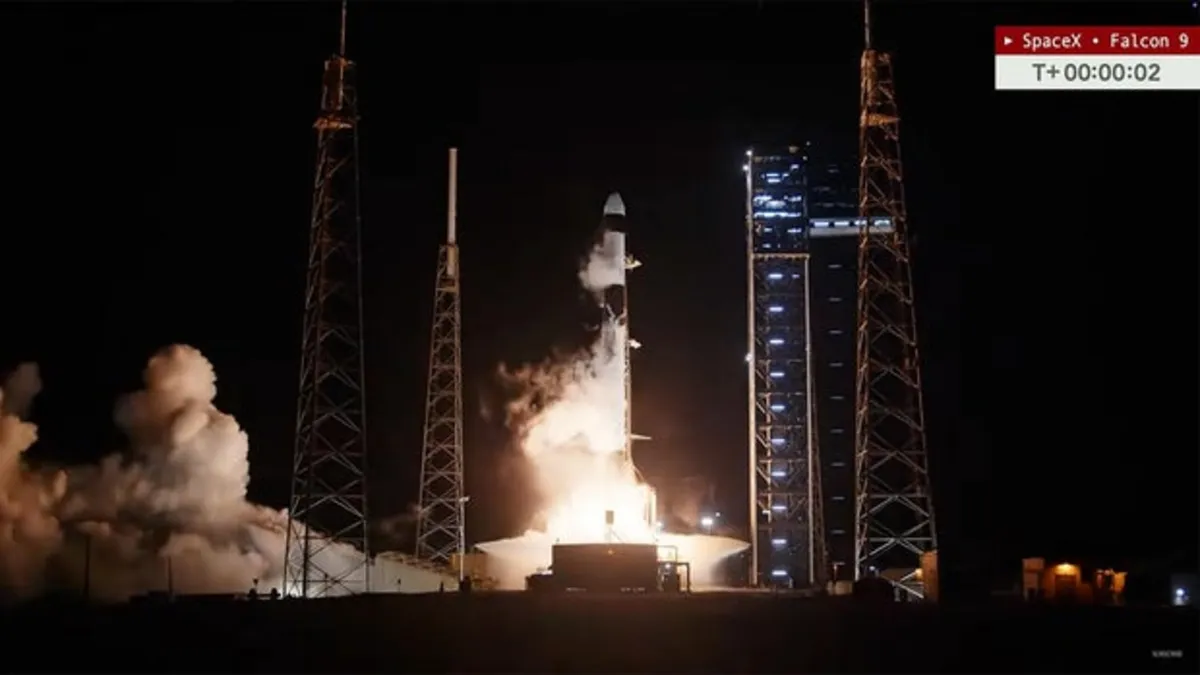
On early Sunday, SpaceX successfully launched its 33rd resupply mission to the International Space Station (ISS), sending a Dragon capsule packed with 2.5 tons of essential equipment and supplies. The mission, known as CRS-33, also includes an innovative add-on thruster kit designed to help maintain the ISS's altitude over time. The launch took place at 2:45 a.m. ET from the Cape Canaveral Space Force Station, showcasing the reliable capabilities of the Falcon 9 rocket.
The Falcon 9 rocket ascended gracefully into the sky, following a northeasterly trajectory aligned with the ISS's orbit. Just nine minutes and 45 seconds post-launch, the first stage booster successfully returned to Earth, landing on an offshore droneship. Moments later, the Dragon capsule was released from the rocket's second stage, marking the commencement of a 29-hour rendezvous with the orbiting laboratory. If all goes as planned, the Dragon is expected to dock at the station's forward port at 7:30 a.m. on Monday.
Onboard the Dragon capsule are over 2,400 pounds of crew supplies, including nearly 1,000 pounds of scientific gear, and 1,300 pounds of hardware for the space station. Among the provisions, the crew will find a variety of food items, notably more than 1,500 tortillas. Bill Spetch, the ISS operations and integration manager, explained that tortillas are preferred because traditional breads produce crumbs that can float away in the weightlessness of space, making them impractical for long missions.
This mission comes at a significant time for NASA, as they prepare to celebrate 25 years of continuous human presence aboard the ISS this November. Heidi Parris, the associate program scientist for the space station, highlighted the milestone, stating that during this quarter-century, over 280 residents have contributed to more than 4,000 scientific experiments and technology demonstrations. This extensive research represents the collaborative efforts of over 5,000 researchers from more than 110 countries worldwide.
The CRS-33 mission will facilitate 50 research projects, including a groundbreaking study on the impact of microgravity on bone loss, and the deployment of a 3D metal printer. This printer aims to assess the feasibility of manufacturing spare parts and tools on demand in space. Additionally, one notable experiment seeks to develop a 3D-printed implantable medical device that can aid nerve regrowth after injury, delivering essential drugs to support regeneration.
A key component of this mission is the performance of an add-on propulsion system, featuring two SpaceX Draco engines, six propellant tanks, and a helium supply for pressurization. This system is housed in the Dragon's aft trunk section, which is open to space. Bill Spetch noted that the ISS's altitude gradually declines due to atmospheric drag. While the Russian space agency typically conducts re-boost operations, this new boost kit will enable the Dragon to assist in maintaining the station's altitude.
The boost kit is expected to initiate its operations starting in September, with a series of burns planned throughout the fall of 2025. The CRS-33 Dragon capsule will remain docked at the ISS until December, during which time the boost kit is projected to provide propulsion equivalent to one and a half Progress missions. Sarah Walker, the director of Dragon mission management at SpaceX, stated that this boost kit will supply approximately a quarter of the propulsion required annually to sustain the ISS's altitude of 260 miles.
The first burn, designed to last about 20 minutes, is scheduled for September 3. This innovative approach not only enhances the mission's objectives but also reinforces SpaceX's commitment to supporting the ongoing operations of the International Space Station.